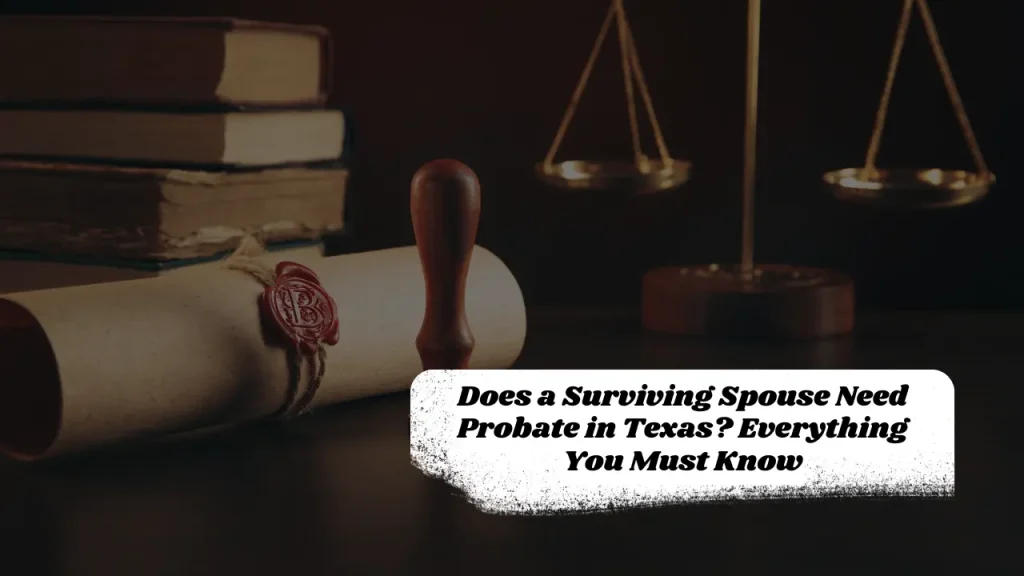Does a Surviving Spouse Need Probate in Texas? Everything You Must Know
Did you know that 60% of Americans don’t have a will, leaving their families vulnerable to complex legal processes like probate? If you’re a surviving spouse in Texas, understanding probate could save you time, money, and stress.
The short answer is it depends. Some assets transfer automatically to the surviving spouse, while others may require probate proceedings. Understanding when probate is necessary and how to avoid it can help you complete the process more smoothly.
What Is Probate in Texas?
Probate is the legal process of validating a deceased person’s will, paying debts, and distributing assets. In Texas, it typically involves court supervision and can take 6–18 months, costing 3–7% of the estate’s value in fees (Source: American Bar Association).
When Probate Is Not Necessary for a Surviving Spouse
Certain assets bypass the probate process and transfer directly to the surviving spouse or other designated beneficiaries. These include:
1. Jointly Owned Property
If a couple owned assets as joint tenants with right of survivorship, the surviving spouse automatically assumes full ownership without probate.
2. Community Property with Right of Survivorship
Texas allows married couples to create a written agreement specifying that their community property will transfer to the surviving spouse without probate (Texas Estates Code § 112.051).
3. Beneficiary-Designated Accounts
Certain assets have designated beneficiaries, which means they do not go through probate. These include:
- Life insurance policies
- Retirement accounts (401(k), IRA)
- Payable-on-death (POD) bank accounts
- Transfer-on-death (TOD) securities
4. Assets in a Trust
If the deceased spouse placed assets in a revocable living trust, those assets transfer directly to the named beneficiaries without probate.
Related article for you:
What Is a Child Entitled to When a Parent Dies Without a Will?

When Probate Is Necessary for a Surviving Spouse
In some cases, probate is required, especially when assets are solely owned by the deceased spouse or have unclear ownership.
1. Solely Owned Property
If the deceased spouse owned real estate, vehicles, or other assets in their name alone, probate may be necessary to transfer ownership.
2. No Right of Survivorship
Community property that does not include a right of survivorship agreement typically requires probate to establish the surviving spouse’s legal ownership.
3. Unclear or Contested Ownership
If ownership of assets is disputed or unclear, probate provides a legal process to settle claims and ensure proper distribution.
Simplified Probate Options in Texas
Texas law provides several simplified probate alternatives to help surviving spouses avoid lengthy court proceedings.
1. Small Estate Affidavit
If the estate is valued at $75,000 or less (excluding the homestead), heirs can use a Small Estate Affidavit to claim assets without going through probate (Texas Estates Code § 205.002).
2. Muniment of Title
If the deceased spouse had a valid will and no debts (except for real estate mortgages), the surviving spouse can use a Muniment of Title to transfer real estate without a full probate process (Texas Estates Code § 257.001).
Legal Protections for Surviving Spouses in Texas
Texas law provides several protections to ensure the financial well-being of a surviving spouse:
1. Homestead Rights
The surviving spouse has the right to live in the family home for life, regardless of who inherits it (Texas Property Code § 41.002).
2. Family Allowance
If the estate lacks sufficient funds, the court may grant a family allowance to provide for the surviving spouse’s living expenses for up to one year.
Steps if Probate is Required
- File a Petition: Submit the will (if any) to the county court.
- Notify Heirs and Creditors: A 2-week public notice is required.
- Inventory Assets: Appraise and list all estate property.
- Pay Debts: Use estate funds to settle outstanding bills.
- Distribute Remaining Assets: Follow the will or intestate laws.
Key Takeaways
- Not all assets require probate—jointly owned property, accounts with designated beneficiaries, and trust-held assets transfer automatically.
- Probate is necessary if assets were solely owned by the deceased spouse or lack proper survivorship designations.
- Texas offers simplified probate options, such as a Small Estate Affidavit or Muniment of Title, for qualifying estates.
- Surviving spouses have legal protections, including homestead rights and potential financial allowances.
Conclusion
Whether a surviving spouse in Texas needs probate depends on how assets are titled and estate planning choices made before death. If probate is required, Texas offers streamlined options to simplify the process.
For legal guidance specific to your situation, consulting with an experienced Texas probate attorney is highly recommended.
Helpful Resources
- TexasLawHelp.org – Probate Alternatives
- State Bar of Texas – Estate Planning & Probate
- Texas Estates Code – Probate Laws
About the Author

Sarah Klein, JD, is an experienced estate planning attorney who has helped clients with wills, trusts, powers of attorney, and probate matters. At All About Lawyer, she simplifies complex estate laws so families can protect their assets, plan ahead, and avoid legal headaches during life’s most sensitive moments.
Read more about Sarah
